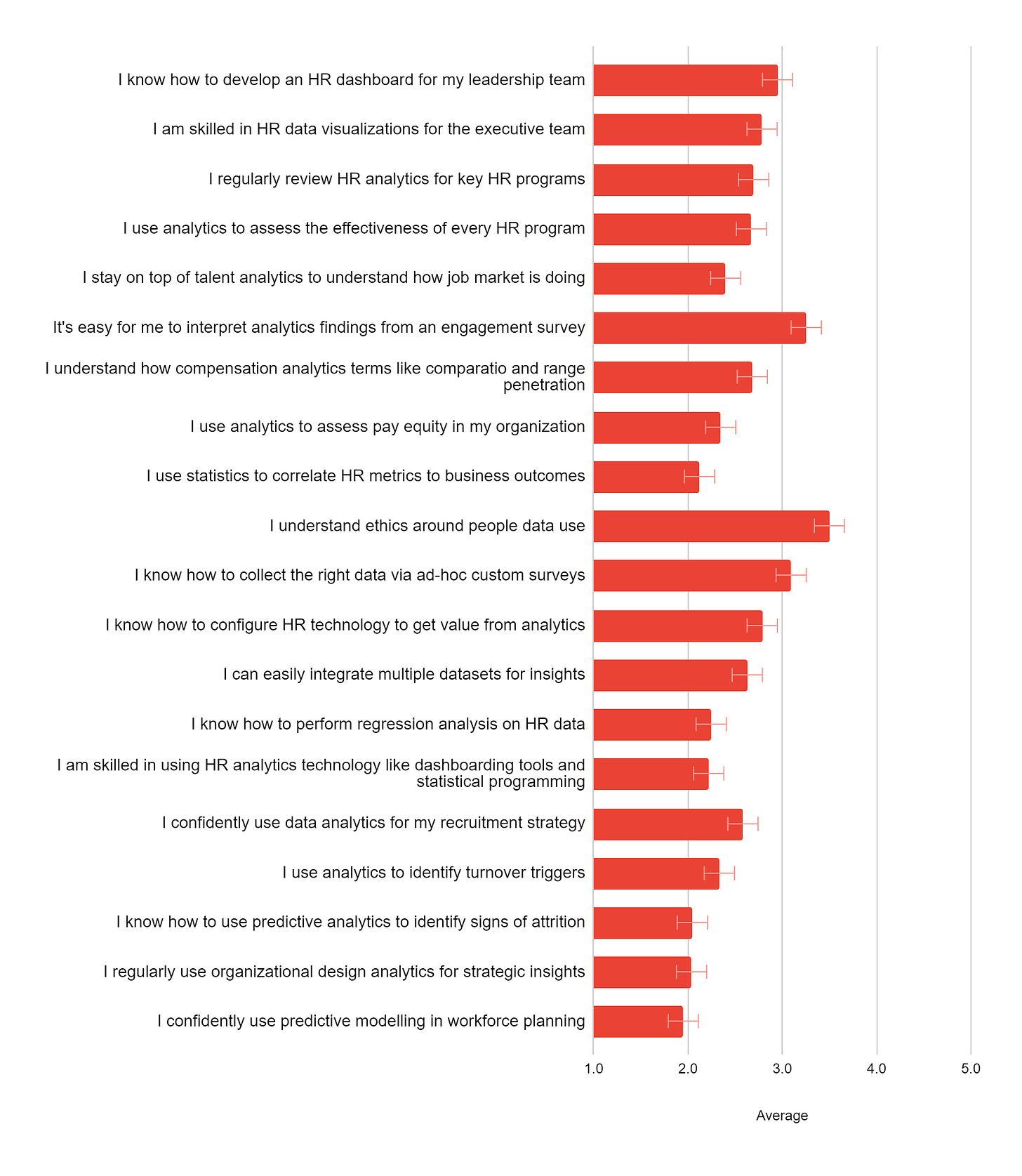State of HR Data Literacy Q1 2024
Where Do We Stand?
Hey all,
I gotta say, the last few weeks have been truly humbling from the social media presence perspective. I've just crossed 4,000 followers on LinkedIn (+308% since I started), 900 followers here (+400% since I picked it up again), and 130+ people in the Toronto People Analytics group.
Thank you for your support! 🙏
Today, however, I want to discuss our progress regarding Data Literacy Assessment, which involves collecting data daily.
Interesting in completing yours? Here is the link!
So, ready to check the results?
Overall scores
The 67 participants thus far have generated an average data literacy score of 52/100. This means most people did not feel confident about their HR data analytics skills.
But also there is still a lot of room for improvement.
If you are interested in learning people analytics and how to apply it in HR, check out my Practical People Analytics course. In it, you will roll up your sleeves and learn how to use data daily for various tasks, including retention, dashboards, engagement, performance, and compensation.
Let's look into different areas:
Here, we see that, on average, very few people respond neutrally to their capability to use analytics in each area. That makes sense, given that most people don't learn people analytics as part of their HR program.
Interestingly, however, we see a significant gap in workforce planning and recruitment, although these areas have much more data than any other areas.
What is going on?
This area contains the most advanced analytics, including predictive modelling, organizational design analytics, and survival analysis.
These few tools are not readily known to HR and even people analytics specialists and often exist outside of HR in analytics centres of excellence, finance, and data science teams.
Naturally, HR people are likely to have been removed from using analytics to begin with and, therefore, feel uncomfortable with these advanced models.
Still, these models answer fundamental HR questions:
How do you plan your workforce for success?
Where can I expect attrition?
What predicts recruiting a successful candidate?
So, there is a huge value to unlock in this area of people analytics.
On the other hand...
We see that understanding of ethics, engagement surveys, and dashboards are taking the lead for people analytics and HR professionals in terms of confidence.
We see scores reaching for 4 ratings and above for a few individual entries!
That is good news because it shows that we know some basics of people analytics.
We need to take them to the next level!
Finally, I asked everyone how they feel about the knowledge of people analytics around them.
Here are some results:
Almost 75% of respondents did not feel that HR teams are skilled in analytics in their own area, and about 60% did not think that their own team is skilled.
When it came to how people felt about their own understanding, they were more positive, which makes sense, given that these people navigated to Practical People Analytics to learn more about the subject.
However, the percentage here was still relatively low.
All in all, I think we recognize where the gap is in HR analytics.
The question is: when will we close it?
Cheers,
K
Whenever you're ready, there are 2 ways I can help you:
#1
If you're still looking to get started in People Analytics, I recommend starting with my affordable course:
Practical People Analytics: Build data-driven HR programs to 10x your professional effectiveness, business impact, and career. This comprehensive course will teach you everything from building an HR dashboard for business results to driving growth through more advanced analytics (i.e., regression). Join your peers today!
#2
If you are looking for support in your human capital programs, such as engagement, retention, and compensation & benefits, and want to take a more data-driven approach, contact me at Tskhay & Associates for consulting services. Or simply reply to this email!





